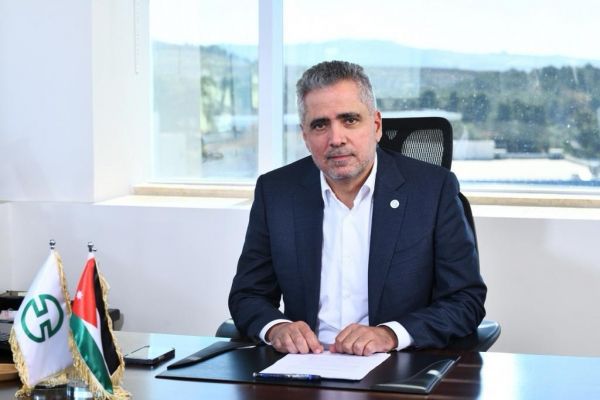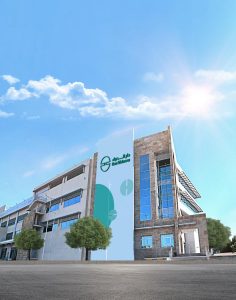
By : Nedal Zubeidi
Jordan Daily – Dar Al Dawa for Development & Investment company , is a prominent leader in pharmaceutical and consumer health products across the MENA region, has recently announced its remarkable achievements, which include a significant increase in revenue, market share, and customer satisfaction.
The company has also launched several new products and services, and expanded into new markets and segments. It attributes its success to a combination of factors, such as restructuring, innovation, strategic partnerships, and customer service.
In interview with its CEO , Dr. Khaled Harb , he pointed out that the company underwent a major restructuring to adapt to the changing market landscape and to pursue growth opportunities. The company reallocated resources to new markets and partnerships, which resulted in improved product accessibility and financial performance.
Following is full text of the interview:
JD – With the net profit for the year 2023 reaching more than JD 3 million, could you elaborate on the specific strategies implemented to achieve this significant increase compared to the previous year?
We are indeed proud of our achievements, which reflect the hard work and dedication of our entire team. Their efforts have truly paid off, enabling our company to make a positive impact on patients and the broader healthcare landscape. We are committed to continuing our efforts to improve health outcomes and make a positive impact on the communities we serve.
Identifying a single factor behind our success is challenging, as it usually results from a combination of efforts. Although I cannot disclose specific details, I can share that our company underwent significant restructuring. This decision was not made lightly, as we carefully evaluated our operations to ensure we are well-positioned for the future. The restructuring was motivated by several factors, including the evolving market landscape, a drive to optimize efficiency, and a desire to invest in growth opportunities. It allowed us to reallocate resources towards promising new markets and strategic partnerships, and we are pleased to see positive results from these changes, including an increase in our market share, enhanced product accessibility, and improved financial performance. We understand that change can be unsettling, but we are committed to supporting our valued employees throughout this transition with comprehensive support programs, including career counselling and reskilling opportunities.
Moreover, we have optimized our operations with a strong focus on supply chain efficiency, manufacturing process optimization, digitalization, quality control automation, and data-driven decision-making. Our strategy for organic growth involves innovation, strategic partnerships, and a dedication to providing excellent customer service. By developing new marketing channels and reaching new customers and segments, we remain true to our core values. Our growth has gone hand-in-hand with ethical practices and a commitment to patient safety, as we have invested in educational initiatives to raise awareness and provide scientific education to empower healthcare providers to make informed decisions.
At the same time, we have begun to invest in future growth through research and development to bring new and improved medications to market. Navigating this pipeline takes time, but we are committed to remaining at the forefront of development. I am confident that this focus will drive our future growth, and patients will benefit from our efforts in the years to come.”
JD – With the notable increase in working capital from 2022 to 2023, what measures or investments were undertaken to optimize this capital and drive further growth?
We believe in a holistic approach to financial management. By effectively managing working capital, we create a solid foundation for sustainable growth and contribute to the company’s long-term success. We took a multifaceted approach to optimizing working capital and fostering growth including inventory management, cash flow management: debt management and investments in growth; thus we were able to improve efficiency, free-up resources and enhance financial flexibility.
JD – What measures are being taken to sustain and potentially enhance the 24% increase in net sales, particularly considering market competition and potential economic fluctuations?
In 2023, our company’s net sales experienced a remarkable growth of 24%, as we expanded our reach into new markets both geographically and in terms of customer segments. Our growth strategy is focused on expanding our product portfolio and forging strong partnerships with regional and multinational companies. We have been continuously registering our existing products from Jordan in other markets where we operate, ensuring a wider range of treatment options for patients without the need to duplicate research and development efforts.
On another note, we are thrilled to expand our presence in existing markets through partnerships with multinational companies. Our first partnership agreement has been signed with a leading multinational company for the Algerian market. This partnership will leverage Dar Al Dawa’s expertise and reach to bring its products to a broader patient base, while we benefit from the global leader’s commitment to quality and innovation, enhancing our ability to serve patients in Algeria. Partnerships with multinational corporations are set to significantly drive our growth in the near future.
Furthermore, research and development (R&D) is at the core of our mission. We are constantly exploring new avenues for developing and delivering essential medications, including the development of new formulations and exploring new possibilities in drug development and delivery systems. We are committed to maintaining this momentum to continue our sales growth, while acknowledging the dynamic nature of the pharmaceutical industry
JD – Could you please provide details on the current market share of your company in the local market? and how do you plan to maintain or expand this share, and are there any targeted growth areas or market segments?
Our company is achieving significant gains in market share within Jordan, reaching 4.8% in 2023 and ranking as the fifth among all operating pharmaceutical companies. We have set ambitious goals to increase our market share to 5.5% and elevate our position to be among the top 3 pharmaceutical companies.
The pharmaceutical industry presents a competitive landscape, and we are employing strategic approaches to maintain and expand our market share. These strategies include enhancing cost-efficiency, ensuring product quality and consistency, maintaining a reliable supply chain, and fostering strong customer relationships.
We plan to grow vertically across most of our therapeutic classes. Starting from 2025, we anticipate the introduction of groundbreaking medications that will further reinforce our position in the market.
JD – Could you provide insight into the company’s export strategy and which markets you primarily export to, as well as any plans for diversification or expansion into new markets?
Our export strategy prioritizes quality and affordability, aiming to make healthcare more accessible to everyone. We currently export our products to the MENA region, which represents a significant market for pharmaceuticals, including countries such as Saudi Arabia, the UAE, Algeria, Iraq, Morocco, Tunisia, and other GCC countries.
We aim to broaden our reach into African countries, addressing the critical need for affordable medicine in regions struggling to provide it, as well as into Eastern European countries with large populations in need of affordable healthcare options.
Egypt represents a potential future market, contingent upon the stabilization of its market dynamics. It is a significant market with a high demand for affordable healthcare options, making it an attractive option for future expansion.
JD – How would you assess the current level of governmental support for the pharmaceutical industry, and are there any advocacy efforts or collaborations in place to further enhance support in key areas?
Jordan’s pharmaceutical sector is currently undergoing an exciting phase of development. Recognizing the industry’s significant potential as the second key contributor to the national economy, the Jordanian government has underscored its strategic importance for economic growth. This recognition has led to increased emphasis on sector development as part of Jordan’s Economic Modernization Vision, which aims for excellence across 14 industrial sectors, including pharmaceuticals. The vision’s goal is to bolster national development by increasing production, creating high-quality jobs, and boosting exports at both regional and global levels, thereby making a notable contribution to Jordan’s trade balance.
The government’s strategic vision and support have notably benefited Jordan’s pharmaceutical industry. For instance, the robust regulations enforced by the Jordanian Food and Drug Administration (JFDA) play a pivotal role in ensuring the quality, safety, and efficacy of pharmaceutical products, fostering a sense of security and trust among domestic and international stakeholders.

Despite the government’s commendable efforts, the sector requires further support to remain competitive, especially as Jordanian companies navigate the challenges of innovation investment in future segments such as biological products, biotechnology, biosimilars, and maintaining cost efficiency against larger companies that benefit from economies of scale.
To sustain innovation and enhance the competitive edge of Jordanian pharmaceutical companies, increased collaboration between the government, the industry, and academic institutions is essential. Such collaboration can leverage each party’s strengths, facilitating research and development, promoting knowledge sharing, and streamlining regulatory processes. Additionally, with a significant portion of the industry reliant on exports, controlling operational costs is crucial for maintaining global market competitiveness. The government could lead by offering support through tax breaks, subsidies, financial assistance, and establishing exemption programs. Moreover, playing a pivotal role in streamlining administrative procedures and improving the interface between relevant authorities, such as customs, the Ministry of Commerce, and the Jordan Food and Drug Administration, is vital.
Furthermore, enhancing cash flow through faster government payments for outstanding invoices could positively impact operations and investments. Initiatives to streamline payment processes and establish timeframes for invoice processing would be highly beneficial
JD – Regarding technological advancements in the pharmaceutical industry, how does the company approach innovation and R&D, and what recent developments or projects highlight this commitment?
We believe that our company plays a pivotal role in enhancing the accessibility and affordability of essential medicines. Although our primary focus is on replicating existing brand-name drugs, we recognize the importance of innovation within our research and development (R&D) processes. For example, our R&D efforts are directed towards developing super generics and value-added products that feature advanced delivery mechanisms to improve patient adherence, extended-release formulations to enhance affordability, and combination therapies to improve treatment outcomes. Additionally, we are exploring various formulations of existing drugs to enhance their delivery, stability, and overall patient experience. As complex biological drugs become off-patent, our focus is increasingly shifting towards developing biosimilars. This move highlights the substantial costs associated with the R&D of biologicals and biosimilars, underscoring the necessity for governmental support in these endeavours.
JD – In terms of long-term sustainability and growth, what are the company’s priorities and strategies, considering factors such as regulatory changes, market trends, and evolving consumer preferences?
That’s a great question! We adhere to a two-pronged approach to ensure long-term success: forging strategic partnerships and maintaining a steadfast commitment to innovation. Our partnerships with multinational pharmaceutical companies are multifaceted, involving licensing, technology transfers, and joint research and development efforts. This collaboration enables us to manufacture new medications and export them regionally.
Secondly, our dynamic approach to research and development (R&D) is crucial for sustaining long-term success. This includes developing new generic formulations, enhancing manufacturing processes, and embracing new technologies.
We are equally committed to environmental sustainability, recognizing its importance in providing high-quality, affordable medications. Sustainability is a guiding principle in our operations and decision-making processes. We are dedicated to reducing our environmental footprint, continuously seeking and adopting more sustainable practices in our manufacturing processes. This includes optimizing resource use and reducing the reliance on harmful chemicals. Furthermore, we are exploring the adoption of recyclable and biodegradable packaging materials to lessen our environmental impact and promote responsible waste management.
Maintaining our company’s strength into the future requires focused effort, but the most crucial aspect of our work is ensuring people have access to the medicines they need. We are committed to this mission for the long haul.

